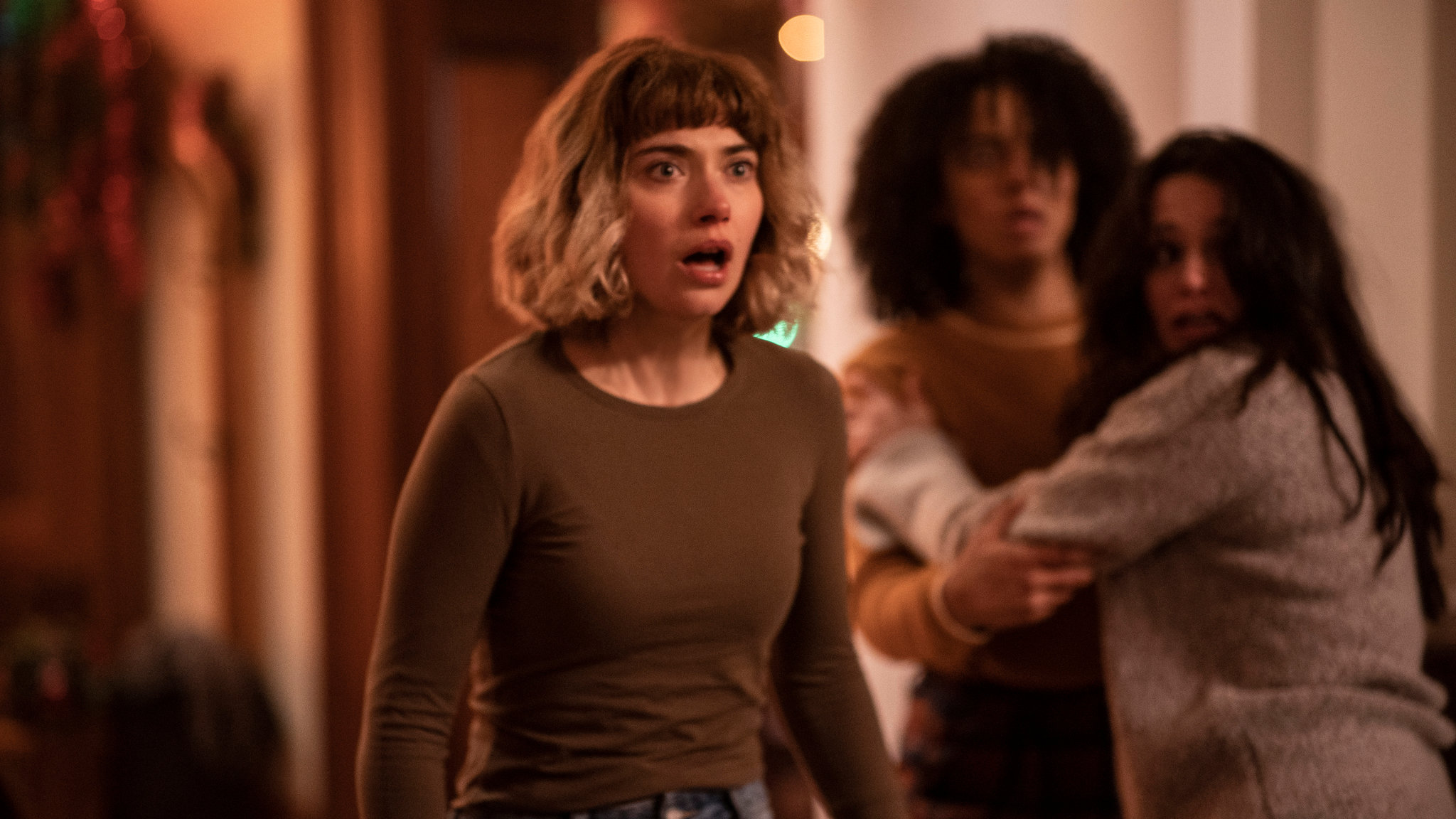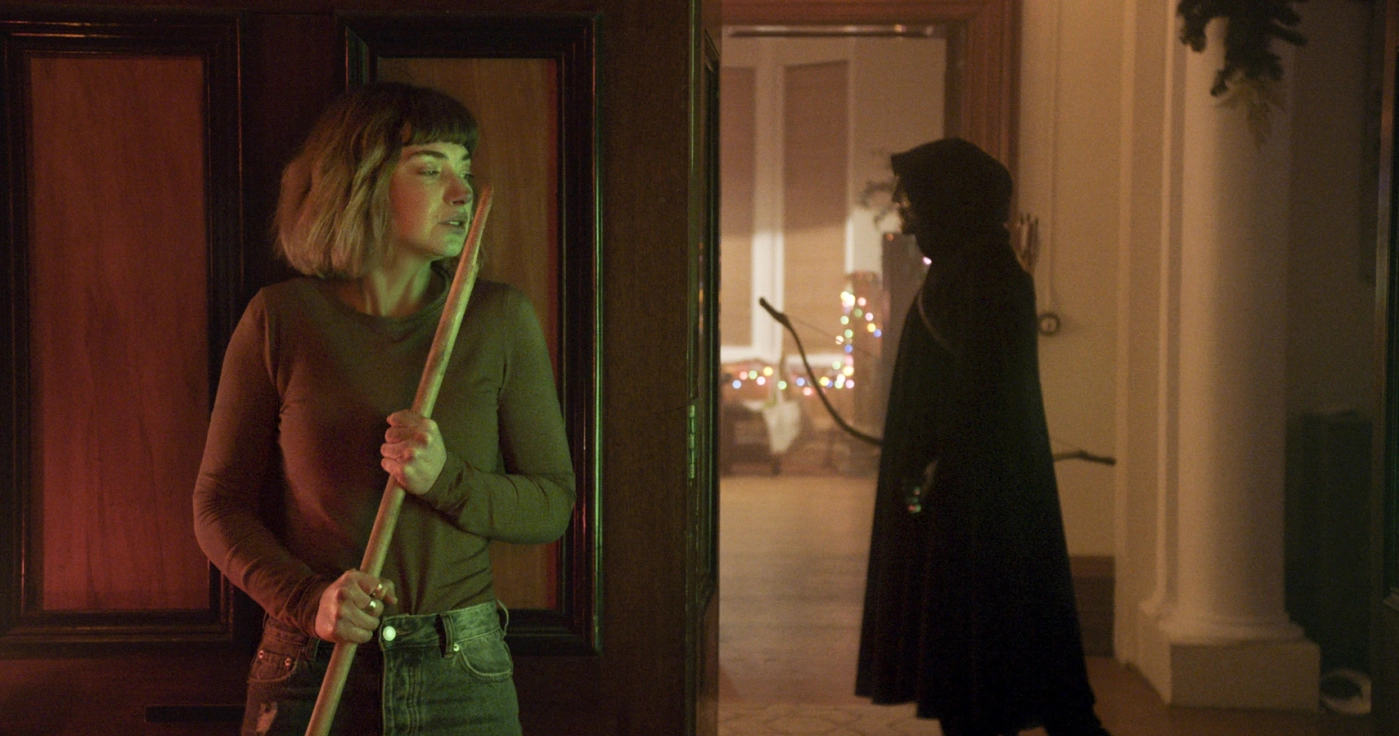In A World Built On Rape Culture, ‘Black Christmas’ (2019) Is More Important Than Ever

On election night, political lightning rod Nick Fuentes tweeted: “Your body, my choice. Forever.” That chilling refrain has been lodged in my brain ever since. The internet quickly flooded with countless incels responding to women’s posts with those barbaric words. Such online vitriol irrefutably spills over into real life, feeding victim blaming and sexual violence against women. As Trump’s second term looms, I am reminded of 2019’s savagely panned Black Christmas remake, written by April Wolfe and director Sophia Takal. The film, turning 5 on December 13, set the internet ablaze.
Many condemned the film for being too hamfisted, clobbering you over the head with its #MeToo messaging. During what feels like a perverse Black Mirror episode, it’s not a time to be subtle (and perhaps it never was). At the time of its release, we were approaching the end of Trump’s first presidential term. While we could see the light at the end of the tunnel, fear still percolated in our society that the worst president on record could retain power. As history repeats itself now, Black Christmas remains increasingly vital as a fire-cleansing piece of feminist rage that captures the energy required for the next four years (and beyond).
Dread Central’s editor-in-chief Mary Beth McAndrews said it best when she spoke with Variety about the 2025 release of her directorial debut, Bystanders: “What I think is great about this year is that it’s no longer subtext. A lot of these female directors are saying, ‘I’m no longer trying to be subtle. I want to take a hammer and smash you in the face with it.’ Subtlety is great, but in this day and age when we are trying to be heard [it’s] no longer a time for subtlety.”
1974’s Black Christmas, which also turns 50 this year, is far less subtle than meets the eye. Despite being a Canadian film, it arrived one short year after the landmark Roe v. Wade case in the United States. It’s hard to imagine that the socio-political movement did not directly guide screenwriter Roy Moore’s script and director Bob Clark’s many story alterations. With its clearly sketched pro-choice subplot, given to lead character Jess Bradford (Olivia Hussey), the story relies on the cinematic tradition of the objectification of and disgust of women. The killer, known only as Billy, prank-calls girls of a sorority house; his vulgar taunts—“Lick it! Let me lick your pretty piggy cunt!” among them—feel ripped straight off a thread of Twitter replies or YouTube comments.
That icky feeling many viewers experience watching the original film, including Wolfe and Takal, significantly influenced the 2019 reinvention. The creative team distilled the original’s obscene phone calls, as well as Peter’s (Keir Dullea) pro-life stance and combative nature, into a triumphant barnburner. Its depiction of female retaliation seemed silly for many, particularly the supernatural elements. But it now carries a profound significance around women’s agency, both male and female complicity, and how to best navigate the tumultuous flood waters of the last several years.

In Black Christmas (2019), Riley (Imogen Poots) shrinks away from the world after her sexual assault when she was a freshman. Set at Hawthorne College, the film uncorks the brutal reality of campus rape culture in a way that feels honest, raw, and unapologetic. Riley’s friends—Kris (Aleyse Shannon), Marty (Lily Donoghue), and Jesse (Brittany O’Grady)—rally behind her and offer up unwavering support and encouragement. “Rebuild yourself, bitch!” Kris whispers to Riley during a Christmas-themed performance, an upended “Up on the Rooftop,” taking aim at Riley’s abuser Brian Huntley (Ryan McIntyre), who happens to be in attendance. The frat bros boo them off the stage, while the rest of the audience commends them for their bravery.
It’s these “heavy-handed” moments that give the film tremendous weight and fuel the vengeance pumping in the women’s veins. Within such an approach, the audience witnesses the urgency and necessity of pushing buttons and igniting a rebellion. It’s hard to fathom Black Christmas playing it subtly during a time when MAGA politicians and their cohorts strip away civil liberties and equal rights. It’s not a time to shy away from speaking out, confronting enemies, and clawing away at the patriarchy.
As cloaked figures (frat bros dressed in flowy black gowns and wearing disturbing masks), Riley, Kris, and every other woman must fight back if they have any hope of survival. Night has fallen, and the mysterious individuals, many of whom wield bows and arrows, froth at the mouth. Their bloodlust can not be satiated until every single rebellious woman has been taught a grave lesson about falling in line. But the women band together—except for Helena (Madeleine Adams) who proves to be a backstabber—and unleash hell on earth (quite literally). When the women of another sorority show up, all bets are off, leading to an explosive, fiery end.

“We will never be broken,” Riley says, as she lifts the college founder’s black-oozing bust into the air before smashing it into tiny bits. The frat bros emit strained warrior cries before engaging in hand-to-hand combat with the women. In one of the film’s most important moments, Riley battles Brian Huntley, and the creative team splices the fight scene with Riley’s assault, giving her license to turn her trauma into a weapon. She pulls herself up by the bootstraps and finally conquers her monster once and for all. As fire takes hold of the fraternity house, the remaining women quickly scatter onto the front lawn to behold the ruin. Flames lick the cracked foundation and consume the grotesque, mangled men screaming inside.
Riley’s face says it all. As the fire flickers in her eyes, a smile unfurls across her face. With comrades flanking her from all sides, they stand strong and dig their feet into the snow. While they’ve only destroyed a small corner of the patriarchy, their valiant efforts to chip away at the system are commendable. With the alt-right emboldened by Trump’s impending return to power, we must remember that there’s always darkness before the dawn and that we all possess the strength to confront, combat, and counter evil.
Five years later, Black Christmas remains an urgent reminder that their time is up. Riley is all of us; her triumphant character arc resembles the downtrodden marginalized who defy the terrible odds and rise victorious over our abusers. As we brace for what comes next and endure “Your Body, My Choice” goading, we have to stay vigilant, unite against a common enemy, and stay committed to one another. It’s the only way out of this mess.
Categorized:Editorials
